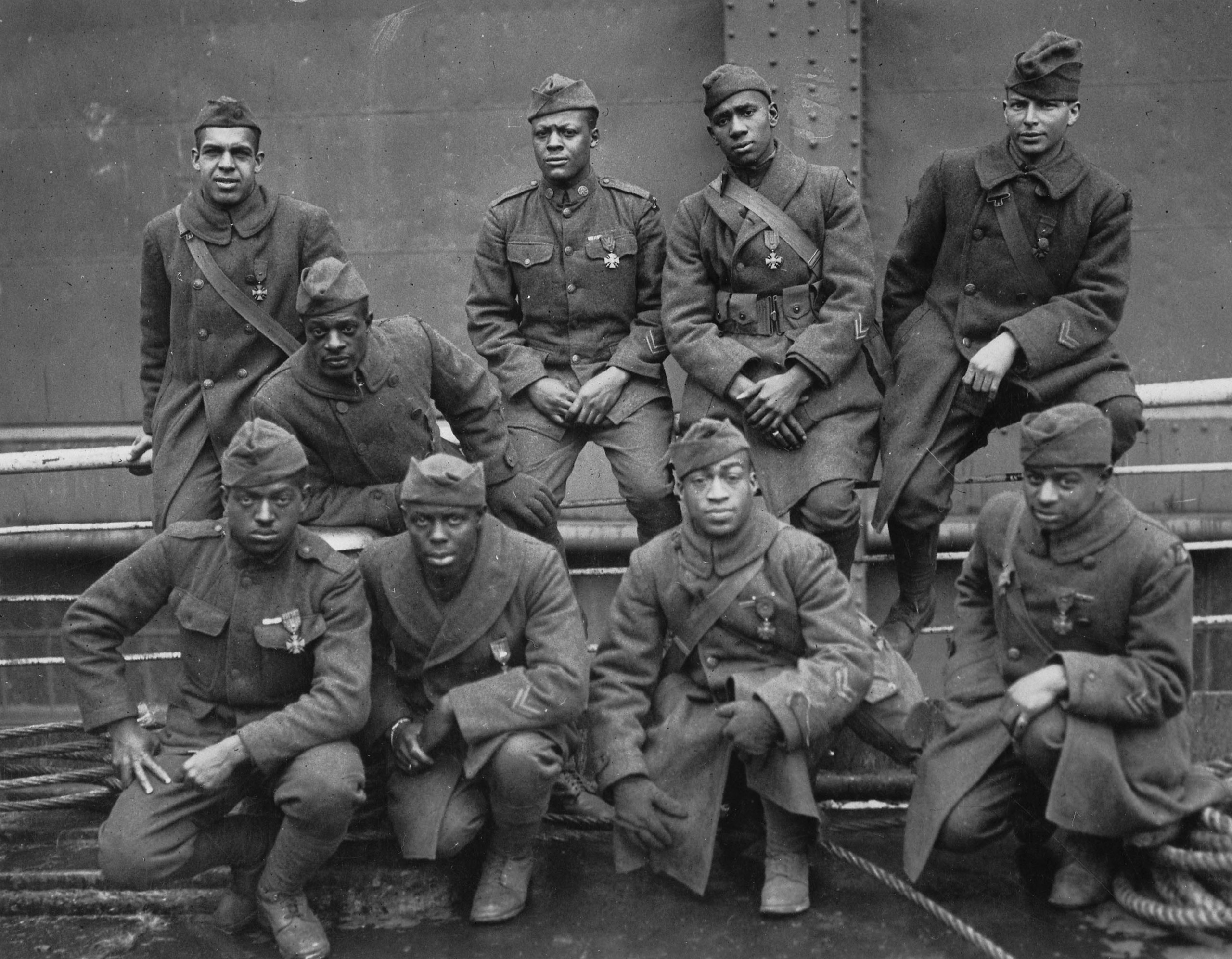Illustration: Soldiers of the 15th N.Y., awarded the Croix de Guerre for gallantry in action, 1919, US National Archives
Sometimes, a century is not long enough to grant recognition to historical heroes’ achievements.
Having commemorated the 106th anniversary of the armistice of November 11, 1918, I want to shed light on a little-known part of the Great War’s history: the Harlem Hellfighters, a regiment of African American volunteer soldiers who fought with the French army in 1918.
For a budding journalist, what better way to tell their story than by giving a voice to a paradoxical American reporter who embodied the purpose of journalism: Irvin S. Cobb.
Cobb was a white reporter from the American South who covered the Great War for the Saturday Evening Post. As he himself admits in his article “Young Black Joe” published on August 24, 1918, he was influenced by the racism of his home. In reporting on soldiers from the regiment on the front, however, he changed his mind. He began advocating for the recognition of these soldiers’ bravery and dedication on the battlefield. Irvin S. Cobb symbolizes the journalist’s role model by being humble and brave enough to confront his prejudices with reality in order to overcome racism and admire Black soldiers. And more importantly, to convey such admiration to his audience of over two-million readers, as a way to attempt the media coverage of their story, in an effort to change American society’s mindset and improve the condition of Black people in the segregated USA.
The “Harlem Hellfighters” is the nickname given to the 15th New York National Guard Regiment, which was one of the first African American regiments to serve with the American Expeditionary Forces (AEF) during World War I. When the Selective Service Act of 1917 ended the ban on African American conscription in the army, 367,000 Black soldiers voluntarily enlisted within the year, many of them being determined to prove to American society that they deserved respect.
In June 1917, the “Old 15th” — as Irvin S. Cobb refers to it — was called into service. Soldiers started training at Camp Whitman in New York, and then at Camp Wadsworth in Jim Crow-era South Carolina, where they experienced racial discrimination and violence. The regiment was forced to leave for France earlier than planned, which left the soldiers with insufficient training. In his report, Cobb relays the descriptions of Colonel Hayward, who organized the regiment. The colonel noted that the soldiers were often ill-prepared to handle weapons and logistics; some soldiers even triggered rockets by mistake on the first night.
Even after their landing in Brest, France on December 27, 1917, African American soldiers still experienced discrimination. They were assigned to labor service duties instead of combat missions. When they started fighting with French troops instead of American ones to avoid segregation policies set up by the U.S. Army, the AEF — military units exported on the Western front — incentivized French soldiers to maintain discrimination. For example, French colonel J. L. A. Linard was persuaded by American military officials to write a pamphlet entitled “Secret Information Concerning Black American Troops” which warned French soldiers against the so-called inferior nature and anti-White sentiments of African Americans.
In his report, Cobb revealed the failure of these measures. He describes the French love of African American troops’ jazz bands, and emphasized non-racist White American military leaders — like Colonel Hayward — who commanded Black soldiers and rejected the segregationist message promoted by the AEF. By giving voice to such views from the front, Cobb challenged the prejudice and the stereotypes conveyed by segregated American society.
But the powerful outreach of the article also relies on the figure of Cobb, a White Southerner conditioned by structural racism, who met African American soldiers on the front and shared his admiration towards these extraordinary men.
Indeed, he praises their physical and moral qualities as soldiers, describing them as daunting, dedicated and respectful. According to Hayward, their motto was “Let’s go!” no matter what hazard awaited them. Cobb gives an account of the exceptional feat of arms of two young soldiers, Henry Johnson and Needham Roberts, who repelled a raid of 24 German soldiers on their own despite being severely wounded. Yet, to Cobb’s mind, nothing proves the Harlem Hellfighters’ bravery better than the everyday heroism of the soldiers.
Cobb lauds not only the soldiers’ military achievements, but also their state of mind as members of a cultural community. Jazz illustrated their joyful and welcoming attitude to reporters, but it also was a way to lift troops and French civilians’ morale and unite people through music. As a result, the Harlem Hellfighters enjoyed an immediate popularity among French people, as shown by this extract from a letter quoted by Cobb, which was written by an eighteen-year-old private officer to his mother: “Mammy, these French people don’t bother with no colour-line business. They treat us so good that the only time I ever know I’m coloured is when I look in the glass.”
The achievements of African American soldiers and the positive reaction of French people threatened the established segregationist order. In consequence, the U. S. Army did not grant any recognition to the Harlem Hellfighters. For instance, while Henry Johnson became the first American to be awarded the French War Cross — an honor which would later be extended to 170 other Hellfighters —, the US army did not award any decoration to the regiment’s soldiers. The AEF even prevented African American officers from taking part in the Great Parade of July 14, 1919 in Paris or featuring in a fresco in the Invalides — celebrations intended to pay tribute to all Allied troops.
Once demobilized in February 1919, the “Old 15th” was the first New York unit to return to the USA. A military parade was dedicated to the Harlem Hellfighters on February 17. This march from 5th Avenue to Harlem became the symbol of African American service to the nation and a point of reference for the civil rights movement. The Harlem Hellfighters were the American regiment which suffered the most losses during the war, with over 1,400 casualties according to the American Battle Monuments Commission.
Although they were welcomed as heroes by the African American community, Black veterans were violently brought back to segregated reality as opposed to the friendly attitude of French people. In fact, racial discrimination worsened during the Interwar period in the United States. Lynchings rose after World War I. As shared by Thomas Saintourens in his book Les Poilus de Harlem, 77 Black people were targeted in 1919, including 10 veterans.
Today, we are faced with the responsibility to honor the Harlem Hellfighters’ memory, not only as brave soldiers who helped an allied nation in distress, but also as trailblazers who stood up against a persistent enemy within their own borders: segregation.
This regiment, which was not recognized by the military in its own time, must be celebrated today. Former president Barack Obama underlined this mission when, on June 2, 2015, he posthumously awarded Henry Johnson the Medal of Honor.Nowadays, Black citizens enlist more than the average population. While Black people represent around 14% of the overall American population, they made up over 20% of the U.S. Army in 2022. Despite their growing numbers, the army is still segregated. Because of their late full integration into the army—which was only implemented after World War II—Black enlistees lack a sense of entitlement as they do not share generations of family service unlike many White officers. Although elite military academies committed to recruiting more applicants from minority backgrounds, these schools are still white-dominated. This undermines the chances of African Americans to engage in infantry and artillery, both prestigious paths leading to high-ranking positions. Ironically, the process of relegation to logistics tasks experienced by the Harlem Hellfighters is still accurate today for Black officers. More than ever, the USA must carry on with its efforts to overcome the legacy of segregation.
Other posts that may interest you:
- Biased Narratives And Independence Dilemmas: What Perspectives For Greenland?
- Learning from partisan conflict could be the last chance to save American democracy.
Discover more from The Sundial Press
Subscribe to get the latest posts sent to your email.





